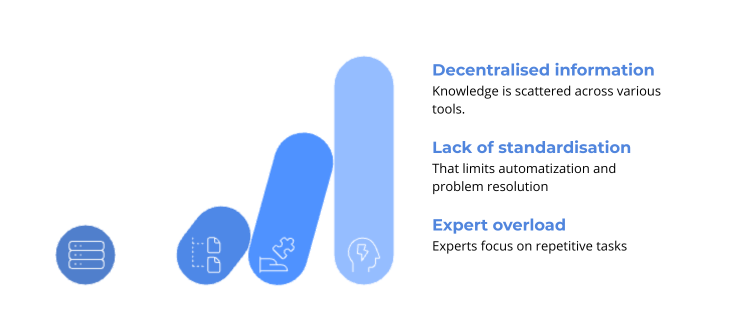Evolution of Telco Network and System Operations. AI Agents as the Ideal Starting Point for Automation.

In a sector that is advancing at a dizzying pace, telecommunications operators are facing a critical dilemma. The need to modernise operations to be more efficient, agile, and profitable is undeniable, especially in the face of high price competition for services, which leads to stagnant and increasingly low revenues. This circumstance has caused a “commoditisation” of telecommunications. Connectivity services are perceived as a simple utility, and competition focuses almost exclusively on price. The answer to these challenges involves a profound transformation, and network automation, driven by Artificial Intelligence (AI), is a central piece of this evolution.
However, for many companies in the sector, the large-scale adoption of AI can seem like an overwhelming task. Recent reports from the TM Forum indicate that operational complexity, deficiencies in internal processes, and cultural resistance represent significant barriers. The lack of technical expertise also continues to be a major obstacle for 44% of operators. Furthermore, operators show a growing concern about the security and data governance when using AI models, with 61% of them expressing concern about the privacy and confidentiality of their information.
In this context, the implementation of AI support agents emerges as a logical and strategic initial advance, as it facilitates a controlled but firm progress for the industry. The adoption of these agents, which offer a safe and proven path, aligns perfectly with a gradual approach. This demystifies the use of AI and demonstrates its business value on a small scale before taking more ambitious steps towards total automation.
The Challenge of Operational Complexity
Traditional operational support systems (OSS) and business support systems (BSS) were not designed for the complexity of modern networks. These systems (monolithic and with proprietary code) hinder agility and innovation, and often require constant manual intervention. This generates a series of “pain points” that directly impact efficiency:
- Decentralised Information: The knowledge needed to resolve incidents is scattered across multiple documents, manuals, tools, databases, or personal support guides.
- Lack of Standardisation: The absence of standardised processes and the dependence on proprietary interfaces limit automation, making problem resolution slow and costly.
- Expert Overload: The most experienced resources are forced to dedicate time to repetitive tasks instead of training, documentation, and innovation.

This situation translates into a significant increase in costs, inconsistent service quality, and prolonged resolution times.
A Safe and Controlled First Step
The roadmap towards total automation does not have to be a leap of faith. A gradual and measured approach, starting with AI agents for operational support, offers a way to leverage the benefits of artificial intelligence while mitigating risks. This path is aligned with the trends advocated by organisations such as the TM Forum and collaboration projects in the industry.
- Knowledge Consolidation: An AI support agent acts as a “copilot” for operations teams. Its main function is to provide quick and contextualised answers to questions in natural language, based on the company’s internal documentation. Unlike public AI models, a specialised support agent is secure, does not “hallucinate” (it does not invent information), and cites the sources of its answers, which builds trust and facilitates verification.
- Paving the Way for Automation: This first step is crucial for laying the foundations for advanced automation. It allows for knowledge to be centralised and patterns to be detected in the most frequently consulted problems. This information is fundamental for identifying the manual processes that can be most easily automated in later stages, whether through Robotic Process Automation (RPA) or service orchestration.
- Evolution towards Closed-Loop Operations models: Once a solid knowledge base has been acquired and patterns have been identified, the next step is to evolve the AI so that it not only responds but also acts. This implies that the AI is capable of proactively detecting anomalies and service degradations, and even making autonomous decisions to resolve them without human intervention. This concept of “closed-loop operation” is a strategic objective in the industry, and its implementation is facilitated by the adoption of open architectures and APIs, a key aspect promoted by collaboration in the telco sector.
A Future Guided by Intelligence
The transformation of a traditional operator into a modern “TechCo” involves deploying intelligent automation and establishing a culture of innovation. Adopting AI agents as a starting point is a strategic move that not only demystifies the technology but also demonstrates its value in the day-to-day and prepares the organisation for a future where networks will be managed proactively and autonomously, thus allowing operators to focus on creating higher value-added services. This gradual approach immediately improves operational efficiency, thus aligning the company with the future trends of the industry, and therefore guaranteeing its long-term competitiveness and growth.
At Optare Solutions, we understand that the path to automation is unique for each operator. Our AI Support Agents solution represents a materialisation of this gradual vision: a tangible and secure tool to initiate the transformation, which consolidates knowledge, accelerates response times, and unleashes the potential of your teams. The progressive integration with your ticketing systems and its ability to analyse and segment incidents make it a catalyst for continuous improvement and cost savings.
If your organisation is ready to take the first safe steps in adopting AI to optimise your operations and lay the foundations for a more automated future, we invite you to contact our team to explore how AI-based solutions can generate measurable and concrete business value in your company.



